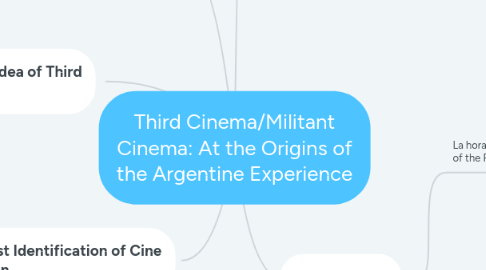
1. 3. Peronist Identification of Cine Liberación
1.1. Post-1968
1.2. Perspective questioned
1.2.1. Classical left viewed Perón as a Populist and Demagogic leader or even Fascist
1.3. Clandestine screening
1.3.1. Variety of La hora de los hornos
1.3.1.1. Middle-class and intellectuals -> First half Worker class -> Second half
1.4. Cine Liberación defended Peronism
2. 4. ‘openness’ of the idea of Third Cinema
2.1. Dichotomy
2.1.1. 2 ideological conceptions of the Cold War
2.2. Militant Cinema in First World
2.2.1. (Zengakuren, ‘militant collective cinema’, Newsreels, etc)
2.3. Strengthening Distribution
3. 5. Distribution
3.1. Essential to militant Cinema
3.1.1. Reach and centrality of the film
3.2. Improve screening experience
4. 1. Toward a Third Cinema
4.1. Toward a Third Cinema. Best known document of Cine Liberación. October 1969.
4.1.1. Three types of cinema and of ‘cine-acción’
4.1.2. Not fully take into account experience of political cinema
4.1.2.1. Militant Cinema: An Intelectual Category of Third Cinema. March 1971.
4.1.3. First Cinema (Hollywood) Second Cinema (Auteur Cinema) Third Cinema (Militant Cinema)
4.1.4. Film event
4.1.4.1. Spectator --> actor
4.1.5. Principal Hypothesis
4.1.5.1. Involvement and integration
4.1.5.2. Instrumentalisation
5. 2. Screenings
5.1. La hora de los hornos, 1968 (The hour of the Furnaces, 1968)
5.1.1. 25k spectators in 8 months
5.1.2. Clandestine screenings
5.1.2.1. Confederación General del Trabajo, known as the ‘CGT of the Argentinians’
5.1.2.2. National uprisings
5.1.2.2.1. Cordobazo* and Rosarizo
5.1.2.3. Radical meetings
5.1.2.3.1. Encuentro de Realizadores Latinoamericanos
5.2. *Cordobazo
5.2.1. Realizadores de Mayo
5.2.1.1. Argentina, mayo de 1969; El camino de la liberación
5.2.1.2. Cine Liberación questioned the political vagueness and lack of commitment in the process of instrumentalisation of the collective film
5.2.1.3. Peronism contrasting with the Nueva Izquierda (New Left)
5.2.1.3.1. the political identity of the group Cine Liberación became more explicit and distinct
5.2.1.3.2. Background for the two definitions of militant cinema in the 1971 document. Peronism and Instrumentalisation.

